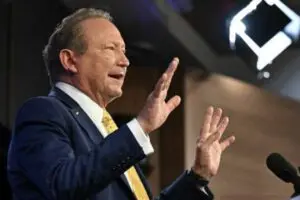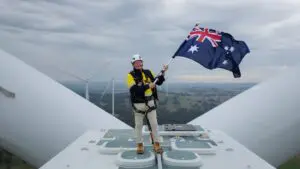It was a big week for the iron ore billionaire and green energy investor Andrew Forrest. It started with a huge party at Fortescue’s Pilbara operations, before swiftly moving through the resignations of three key executives and directors, including the CEO and the CFO.
And it finished with a striking and extraordinary speech given to the “Boao” forum of Asia-Pacific business and government leaders that Forrest and Fortescue hosted in Perth.
It was the sort of speech you hear from climate scientists and climate protesters; a presentation stunning in its simplicity and series of one liners.
“It is business that will kill your children,” Forrest declared. “It is the beginning of the end.
“Humanity it at risk. Now.”
It’s not something you ever hear from a business leader in a public forum, or that is filed in a stock exchange announcement. And more’s the pity. In all, the presentation consisted of more than 120 powerpoint slides.
You can read it here, and I recommend you do because it doesn’t take that long – it’s mostly one liners – and it really is quite striking. You can also watch the video of Forrest’s delivery here. It is 24 minutes long.
The question is, why don’t more business leaders speak like Andrew Forrest? The answer might lie in the reasons behind the revolving door in the Fortescue business.
Forrest has been quoted as saying that he returned from overseas after three months and didn’t like what he saw – the green energy vision he so often espouses appeared to have slipped down the list of priorities at the company.
It’s entirely possible that those executives balked at the realisation that the green energy transition might not be as immediately profitable as they would like. Forrest hinted at that when he admitted that he is prepared to take returns below the normal rate on Fortescue investments to get his first major green energy projects up.
Not everyone gets that, but Forrest insists there is a greater purpose. His company has committed $1.2 billion this financial year, alone, on its green energy projects, and that’s before they actually build any.
“We stick to that future. Individual ambitions become second because, what I’m talking about is the course of humanity,” was how Forrest began the talk at the Boao Forum.
There is a key difference between Forrest and most other executives. Business will talk about net zero, endlessly, but the underlying assumption is that the 2050 target means that the really hard decarbonisation efforts can be punted into the future, well beyond the current KPIs of the existing C-suite.
It’s what allows the likes of AGL, for instance, to tell shareholders that they won’t shut another coal fired power station for another decade, or for any of the companies that make up Big Oil to pay lip service to the whole idea of investing in a green future, and pay out windfall profits to shareholders. It may never be so good.

Some businesses are forced to scramble towards green energy – the giant Pilbara iron ore miners among them – because their customers are now demanding net zero in their supply chains, so they have to find zero emissions electricity and transport for key parts of their operations.
It’s certainly put the wind up the biggest quarry in the world, Western Australia, and is why it has quickly morphed from a green energy laggard and flicked the switch to renewables in such dramatic fashion.
Forrest goes further than all others. Much further. Fortescue’s target is real zero emissions by 2030 – no burning of fossil fuels at all by the end of that year. It is the only legacy business target that we can see that is obviously in line with a 1.5°C scenario. It is a target that all business should be aiming at.
Forrest’s speech was picked up for some of the obvious contradictions, including the hundreds of millions pocketed by Fortescue in the diesel rebate, and even the emissions from flying in 700 guests to the lavish weekend party.
And there is no doubt that Forrest’s speech is pitched to clear the obstacles in the way of giant renewable energy projects, and green hydrogen, and to stop the tens of trillions of subsidies that flow to fossil fuels each year, and send them towards businesses like his.
But that’s exactly what the world needs to have done. The International Energy Agency, the UN, the IPCC, climate scientists, and campaigners all agree. The world’s governments talk big on targeting 1.5°C but – eight hours after Paris – their policies don’t come close.
The International Monetary Fund last week noted that fossil fuel subsidies in 2022 were their highest ever – at $US7 trillion ($11 trillion) or 7.1 per cent of global GDP: That’s $A30 billion a day, or $A1.5 billion an hour, or $A25 million a minute, or nearly half a million dollars every second. It’s madness.
“You can’t uncook an egg,” Forrest says. And in terms of the planet and global warming, he is right. One columnist (in the Murdoch media of course), called his speech “loopy”: and weird. Another, in the AFR, caused it messianic, and it wasn’t meant as compliment.
But why is it weird? These are the statements, these are the actions that are needed to avoid dangerous climate change. Forrest could quite easily sit back and rake in the billions each year from his company’s iron ore billions.
But the climate skepticism is so deeply ingrained – thanks to the deliberate misinformation spread in social media, Murdoch media and elsewhere, and the callowness of our politicians and business leaders – that we flinch and turn our heads when told the reality. It’s time that changed.










